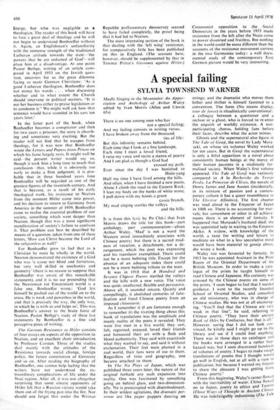Good shepherd
ROBERT BIRLEY
Diehich Bonhoeffer Eberhard Bethge translated by Eric Mosbacher, Peter and Betty Ross, Frank Clarke, William Glen- Doepel (Collins 90s)
The German Resistance to Hitler Hermann Graml, Hans Mommsen, Hans-Joachim Reichhardt, Ernst Wolf, translated by Peter and Betty Ross (Batsford 56s)
Pastor Bethge's life of Dietrich Bonhoeffer is a very difficult book to review. It is going to be one of the foundation stones on which the German—and, in fact, the Euro- pean—history of the twentieth century will be built; but it is not going to be an easy book for English readers. For one thing, it is Nery long. It is about half the length of Morley's Life of Gladstone and the subject of that book lived to be eighty-nine. while Bonhoeffer was executed when he was thirty- nine. We are scarcely used to such massive biographies today, though the Life of Joseph Chamberlain may encourage us.
Then, it is manifestly not written for English readers. The critical Barmen declaration of May 1934, for instance, which led directly to the formation of the Con- fessing Church in opposition to the so-called German Christians, is something of which most Englishmen know little: we are given only a short extract from it and its general tenor is taken as read. Or to turn to theology—and theology inevitably looms large in a life of Bonhoeffer—the influence of Bultmann's lecture (largely unknown in England) on 'The New Testament and Mythology', not only on Bonhoeffer's think- ing, but on that of the Confessing Church as a whole, was very great indeed. The German Evangelical churchman looks back inevitably to Luther, but to "hoat can the member of the Church of England look back? Cranmer, perhaps, who could produce an incomparably beautiful liturgy, but who was negligible as a theologian. The reader of this book will have to face a great deal of theology and he will not begin to understand Bonhoeffer without it. Again, an Englishman's unfamiliarity with the immense strength of the traditional Lutheran attitude towards the state—'the powers that be are ordained of God'—will place him at a disadvantage. At one point Pastor Bethge, writing of an article com- posed in April 1933 on the Jewish ques- tion, uncovers for us the great dilemma facing so mato German Christians: 'As a good Lutheran theologian, Bonhoeffer does not mince his words . . . when discussing whether and to what extent the Church should intervene in political matters. "It is not her business either to praise legislation or to condemn it." We might well ask how that sentence would have sounded in his ears ten years later.'
In the latter part of the book, when Bonhoefler becomes a conspirator and then for two years a prisoner, the story is absorb- ing and sometimes very exciting. But the reader will not find that he escapes from theology, for it was now that Bonhoeffer wrote the Letters and Papers front Prison on which his fame largely rests. It might well be said—the present writer would say so, though it took him a long time to reach that conclusion—that, while it is obviously too early to make a firm judgment, it is pro- bable that in three hundred years time Bonhoeffer will be regarded as one of the greatest figures of the twentieth century. And that is becausc, as a result of his early theological work, his resistance to Nazism from the moment Hitler came into power, and his decision to return to Germany from America in the summer of 1939. Bonhoeffer came to realise the essential problem of our society, something which went deeper than Nazism, though that was a most significant manifestation of society's failure to confront it. That problem can best be described by means of a question, taken from one of these letters, 'How can Christ become the Lord of the religionless as well?'
For Bonhoeffer grew to feel that as a Christian he must be wholly in the world. Newton demonstrated the existence of a God who was 'a cause not blind and fortuitous, but very well skilled in mechanics and geometry' (there is no reason to suppose that Bonhoeffer was aware of this remarkable statement), and it is no use pretending that the Newtonian (or Einsteinian) world is a false one. Bonhoeffer wrote: 'God lets himself be pushed out of the world on to the cross. He is weak and powerless in the world, and that is precisely the way, the only way, in which he is with us and helps us'. This was Bonhoeffer's answer to the brute force of Nazism. Pastor Bethge's study of these last statements by Bonhoeffer is a fine and perceptive piece of writing.
The German Resistance to Hitler consists of four essays on aspects of the opposition to Nazism, and an excellent short introduction by Professor Carsten. Three of the studies deal mainly with the attitudes of the Resistance towards social change, foreign policy, the future constitution of Germany and so on. After reading the biography of Bonhoeffer, one cannot help feeling that the writers have not understood the ex- traordinary complications of life under the Nazi regime. After all, it was not altogether surprising that some sincere opponents of Hitler felt that a Russian victory would take them out of the frying pan into the fire. Nor should one forget that under the Weimar
Republic parliamentary democracy seemed to have failed completely, the proof being that it had led to Nazism.
The most interesting section of the book is that dealing with the -`left wing' resistance, for comparatively little has been published on this in England. (The account here, however, should be supplemented by that in Terence Pritties Germans against Hitler.)
Communist opposition to the Social Democrats in the years before 1933 made resistance from the left after the Nazis came to power disunited and fruitless. But nothing in the world could be more different than the accounts of the resistance movement current in the two Germanies today: a well docu- mented study of the contemporary East German picture would be very interesting.







































 Previous page
Previous page